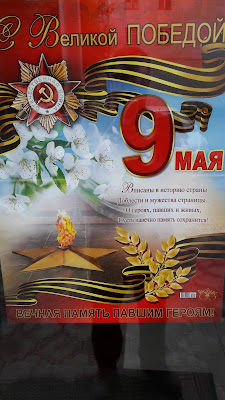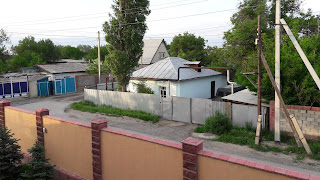I had a conversation a few days ago with my landlord about the problems I was having in my apartment with internet service. Our conversation ended with her asking me a peculiar question, "Do you still have water?"
The fact that I couldn't see a linkage between water and internet service and because I automatically assume that all peculiar questions and statements that occur in my conversations with Kyrgyz folks are a function of linguistic issues, I didn't pay the proper attention to my landlord's question it deserved.
The day after our conversation, I began my morning routine by hopping into the shower, only to find that I had absolutely no hot water. "It seems my landlord is clairvoyant," I muttered to myself as I washed my hair in the freezing water pouring out my bathtub faucet.
When I arrived at work, I discovered that a few of my co-workers were also without hot water. "That's odd," one of them said.
"No, it isn't," said another of my co-workers who has lived in Bishkek for a time. She explained that all the hot water for the entire city of Bishkek is heated in a central, Soviet-era, coal-fired plant that closes for a full month each and every year for maintenance and to clean the pipes. Furthermore, she told us, this process always commences the day after Great Patriotic War Against Fascism Victory Day. "That's some way to celebrate victory," I mused.
Despite everyone's apprehension, our knowledgable co-worker remained ebullient. Don't worry, she assured us, all you have to do is plug in the little water heater above your toilet and that will switch you over to your internal system.
"I don't remember seeing a little water heater above my toilet," I remarked, somewhat anxiously.
"Oh, don't worry, I'm sure you have one," she said cheerfully.
"I think I would remember seeing a water heater above my toilet," I grumbled, certain that no such device existed in my apartment.
When I returned home that evening I discovered that I was not completely oblivious to what items were in my apartment as I stared wistfully at the empty space above my toilet. I decided to send my not-as-clairvoyant-as-I-had-originally-thought landlord a text. It shouldn't be angry in tone, I thought to myself, instead, as I have learned in my years living abroad, presenting a pleasantly confused persona when problem solving as an alien in another land is usually a far more effective approach than being a pissed-off American.
"My friends at work said there wouldn't be any hot water for a month. Is this really true?" I texted.
"Yes. No hot water for a month," was the return text.
It appeared I would have to present a pleasantly confused AND pathetic persona. "Thank you for letting me know," I texted. "Could you please tell me the best place to go in the mornings to get a hot shower in Bishkek?"
About 30 minutes later I received my landlord's reply. "I will send someone to install a water heater in your apartment in the next couple days." Sometimes, though not always, some people do have pity on sadly pathetic Americans.
So, today was the day the hot water heater was installed above the toilet. Only one problem: it doesn't seem to generate hot water. It hisses and makes a range of assertive noises as if it is heating enough liquid to bathe half the Kyrgyz Army. Except it isn't heating anything. Not one drop. It seems the installation crew didn't take the time to verify that the water heater was configured in such a way that it would actually heat water. And now I am left with two water heating systems taking a post-Great Patriotic War Against Fascism Victory Day sabbatical.
This leaves me wondering what to do next. I don't think it is possible for me to sink to lower depths of pleasantly confused and pathetic...and 26 more days of cold sponge baths isn't an appealing prospect. Nor I am enthused about doing what my Tajik co-worker is doing to survive the hot-water drought: he's been heating pots of water on his stove and filling his bathtub with them. For bizarre architectural reasons too complicated to explain now, we actually have a bathroom with a shower in my four-person office, but I am not eager to bathe within two meters of my co-workers' desks while they compose memos and write reports. I suppose all I can do is text "I'm sorry, the new hot water heater is not working" to my landlord and prepare for the next series of mishaps to occur as I dream of steamy baths and contemplate the many things in life we take for granted.
 |
| My new hot water heater, blissfully and uselessly hissing away above my toilet |






























